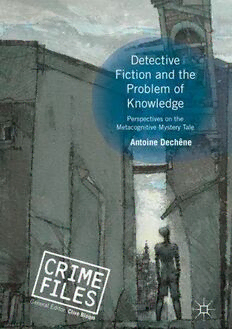
Detective Fiction and the Problem of Knowledge: Perspectives on the Metacognitive Mystery Tale PDF
Preview Detective Fiction and the Problem of Knowledge: Perspectives on the Metacognitive Mystery Tale
Detective Fiction and the Problem of Knowledge Perspectives on the Metacognitive Mystery Tale Antoine Dechêne General Editor: Clive Bloom Crime Files Series Editor Clive Bloom Professor Emeritus Middlesex University London, UK Since its invention in the nineteenth century, detective fiction has never been more popular. In novels, short stories and films, on the radio, on television and now in computer games, private detectives and psycho- paths, poisoners and overworked cops, tommy gun gangsters and cocaine criminals are the very stuff of modern imagination, and their creators a mainstay of popular consciousness. Crime Files is a ground-breaking series offering scholars, students and discerning readers a comprehensive set of guides to the world of crime and detective fiction. Every aspect of crime writing, from detective fiction to the gangster movie, true-crime exposé, police procedural and post-colonial investigation, is explored through clear and informative texts offering comprehensive coverage and theoreti- cal sophistication. More information about this series at http://www.palgrave.com/gp/series/14927 Antoine Dechêne Detective Fiction and the Problem of Knowledge Perspectives on the Metacognitive Mystery Tale Antoine Dechêne University of Liège Liège, Belgium Crime Files ISBN 978-3-319-94468-5 ISBN 978-3-319-94469-2 (eBook) https://doi.org/10.1007/978-3-319-94469-2 Library of Congress Control Number: 2018948739 © The Editor(s) (if applicable) and The Author(s) 2018 This work is subject to copyright. All rights are solely and exclusively licensed by the Publisher, whether the whole or part of the material is concerned, specifically the rights of translation, reprinting, reuse of illustrations, recitation, broadcasting, reproduction on microfilms or in any other physical way, and transmission or information storage and retrieval, electronic adaptation, computer software, or by similar or dissimilar methodology now known or hereafter developed. The use of general descriptive names, registered names, trademarks, service marks, etc. in this publication does not imply, even in the absence of a specific statement, that such names are exempt from the relevant protective laws and regulations and therefore free for general use. The publisher, the authors and the editors are safe to assume that the advice and information in this book are believed to be true and accurate at the date of publication. Neither the pub- lisher nor the authors or the editors give a warranty, express or implied, with respect to the material contained herein or for any errors or omissions that may have been made. The publisher remains neutral with regard to jurisdictional claims in published maps and institu- tional affiliations. Cover illustration: Jean Dechêne, “Un homme dans la ville”, acrylic, 2016. Printed on acid-free paper This Palgrave Macmillan imprint is published by the registered company Springer Nature Switzerland AG The registered company address is: Gewerbestrasse 11, 6330 Cham, Switzerland To Aïcha Cover image: Jean Dechêne, “Un homme dans la ville,” acrylic, 2016 P reface This book is the result of a six-year process. First a dissertation, it has now evolved into the full-length monograph the reader holds. As I was major- ing in Spanish (with a master’s thesis devoted to Antonio Muñoz Molina’s autofiction), I did not expect to write such a work about detective fiction, especially not about its metaphysical branch. I started my research back in 2012. It was part of a bigger project, an IAP (Interuniversity Attraction Poles) program called “Literature and Media Innovations: the question of genre transformations” (http://lmi.arts.kuleuven.be) and financed by Belspo (the Belgian Science Policy Office) (http://www.belspo.be). My work was also attached to the activities of the CIPA (The Interdisciplinary Center for Applied Poetics, http://labos.ulg.ac.be/cipa/), a research center based at the University of Liège. The PhD project was first called “The Metaphysical Thriller as a Literary Genre” and aimed to work on the metaphysical detective story, to define (or redefine) it as a specific genre and/or corpus. I defended my dissertation titled “Unreadable Texts: From the Metaphysical Detective Story to the Metacognitive Mystery Tale” in December 2016. One of my major accomplishments during the PhD is to have been able to organize a two-day bilingual symposium simply titled “The Metaphysical Thriller/Le Thriller métaphysique,” which took place at the University of Liège on September 26 and 27, 2013. This event was an opportunity to gather some important critics in the field of both classical and metaphysi- cal detective fiction. Indeed, the keynotes were no other than Patricia Merivale and Susan Elizabeth Sweeney (the editors of Detecting Texts), John Gruesser (at the time president of the Poe Studies Association), and ix x PREFACE Ilana Shiloh (author of important books on Paul Auster). The conference led to a collective volume, which is the first book dedicated to the genre in French: Le Thriller métaphysique d’Edgar Allan Poe à nos jours (Presses Universitaires de Liège, 2016). Detective Fiction and the Problem of Knowledge has no other ambition than to continue this work by offering a comparative analysis of some of the most emblematic metaphysical detective stories. Such a project would not have been possible without the help of Prof. Michel Delville, whom I thank for his patience and insightful comments during the whole time of my PhD and after. I also want to repeat my thanks to the members of my dissertation committee: Prof. Jean-Pierre Bertrand (ULiège), president of the jury; Kristine Vanden Berghe (ULiège), who has followed my work from the master’s thesis onward; Prof. Jan Baetens (KU Leuven) for coor- dinating the IAP program; and Prof. John Gruesser (Kean University). Many thanks to my colleagues and first peer-reviewers: Kevin, Carole, Valérie-Anne, Benoît, Remy, Christophe, and Sarah. Liège, Belgium Antoine Dechêne c ontents Part I The Problem of Knowledge 1 1 Introduction 3 2 From the Metaphysical Detective Story to the Metacognitive Mystery Tale 13 3 Enigmas of the Sublime and the Grotesque 45 Part II From the flâneur to the Stalker 87 4 Edgar Allan Poe’s “The Man of the Crowd” 89 5 Jorge Luis Borges’s Textual Labyrinths 107 6 Paul Auster’s The New York Trilogy 149 xi
